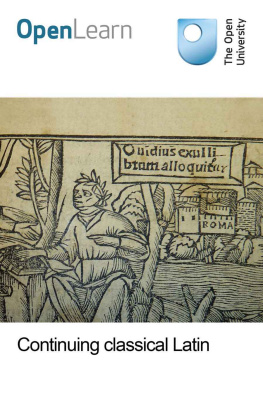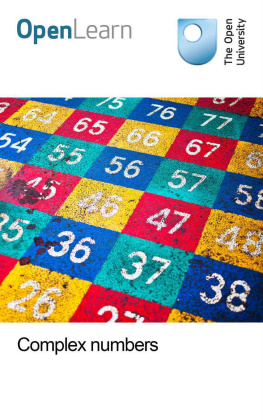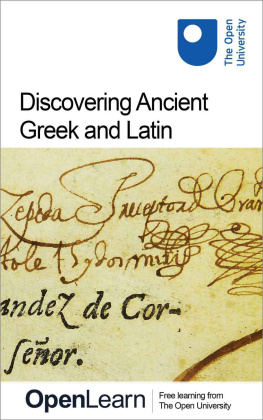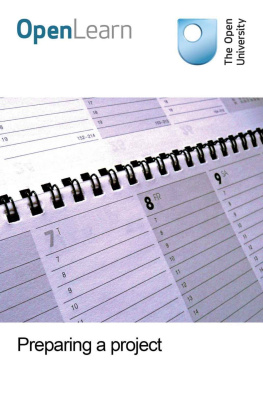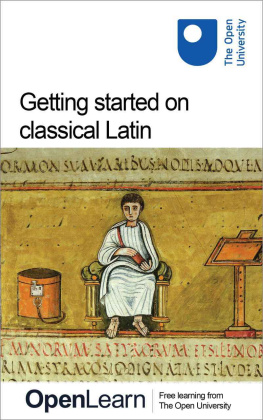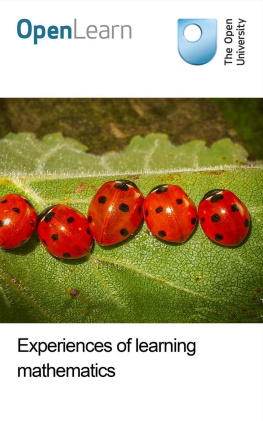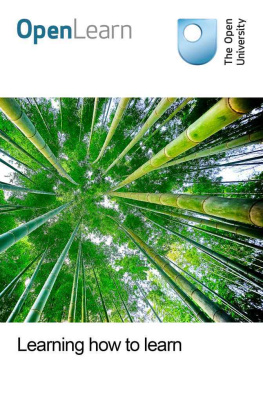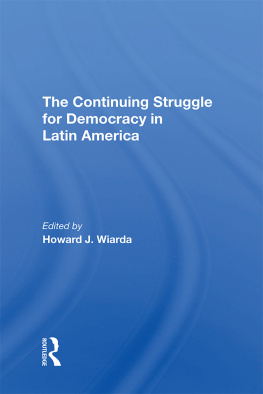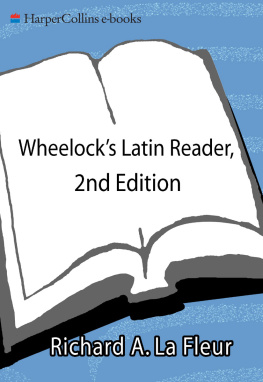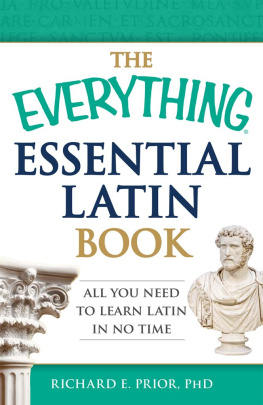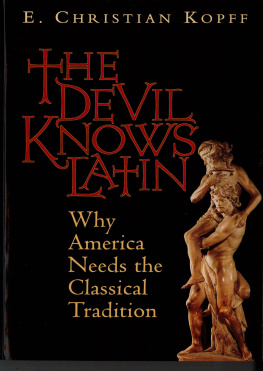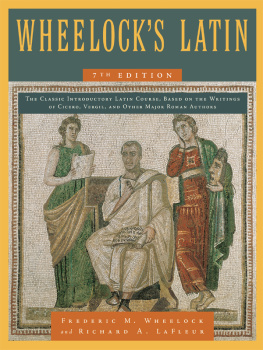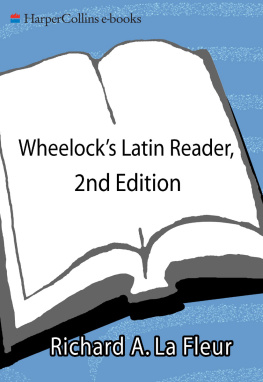University - Continuing classical Latin
Here you can read online University - Continuing classical Latin full text of the book (entire story) in english for free. Download pdf and epub, get meaning, cover and reviews about this ebook. year: 2016, publisher: The Open University, genre: Children. Description of the work, (preface) as well as reviews are available. Best literature library LitArk.com created for fans of good reading and offers a wide selection of genres:
Romance novel
Science fiction
Adventure
Detective
Science
History
Home and family
Prose
Art
Politics
Computer
Non-fiction
Religion
Business
Children
Humor
Choose a favorite category and find really read worthwhile books. Enjoy immersion in the world of imagination, feel the emotions of the characters or learn something new for yourself, make an fascinating discovery.
- Book:Continuing classical Latin
- Author:
- Publisher:The Open University
- Genre:
- Year:2016
- Rating:5 / 5
- Favourites:Add to favourites
- Your mark:
- 100
- 1
- 2
- 3
- 4
- 5
Continuing classical Latin: summary, description and annotation
We offer to read an annotation, description, summary or preface (depends on what the author of the book "Continuing classical Latin" wrote himself). If you haven't found the necessary information about the book — write in the comments, we will try to find it.
Continuing classical Latin — read online for free the complete book (whole text) full work
Below is the text of the book, divided by pages. System saving the place of the last page read, allows you to conveniently read the book "Continuing classical Latin" online for free, without having to search again every time where you left off. Put a bookmark, and you can go to the page where you finished reading at any time.
Font size:
Interval:
Bookmark:
About this free course
This OpenLearn course provides a sample of Level 3 study in Arts and Humanities: http://www.open.ac.uk/courses/find/arts-and-humanities.
This version of the content may include video, images and interactive content that may not be optimised for your device - www.open.edu/openlearn/history-the-arts/history/classical-studies/continuing-classical-latin/content-section-0
You can experience this free course as it was originally designed on OpenLearn, the home of free learning from The Open University
There youll also be able to track your progress via your activity record, which you can use to demonstrate your learning.
The Open University,
Walton Hall, Milton Keynes
MK7 6AA
Copyright 2016 The Open University
Intellectual property
Unless otherwise stated, this resource is released under the terms of the Creative Commons Licence v4.0 http://creativecommons.org/licenses/by-nc-sa/4.0/deed.en_GB. Within that The Open University interprets this licence in the following way: www.open.edu/openlearn/about-openlearn/frequently-asked-questions-on-openlearn. Copyright and rights falling outside the terms of the Creative Commons Licence are retained or controlled by The Open University. Please read the full text before using any of the content.
We believe the primary barrier to accessing high-quality educational experiences is cost, which is why we aim to publish as much free content as possible under an open licence. If it proves difficult to release content under our preferred Creative Commons licence (e.g. because we cant afford or gain the clearances or find suitable alternatives), we will still release the materials for free under a personal end-user licence.
This is because the learning experience will always be the same high quality offering and that should always be seen as positive even if at times the licensing is different to Creative Commons.
When using the content you must attribute us (The Open University) (the OU) and any identified author in accordance with the terms of the Creative Commons Licence.
The Acknowledgements section is used to list, amongst other things, third party (Proprietary), licensed content which is not subject to Creative Commons licensing. Proprietary content must be used (retained) intact and in context to the content at all times.
The Acknowledgements section is also used to bring to your attention any other Special Restrictions which may apply to the content. For example there may be times when the Creative Commons Non-Commercial Sharealike licence does not apply to any of the content even if owned by us (The Open University). In these instances, unless stated otherwise, the content may be used for personal and non-commercial use.
We have also identified as Proprietary other material included in the content which is not subject to Creative Commons Licence. These are OU logos, trading names and may extend to certain photographic and video images and sound recordings and any other material as may be brought to your attention.
Unauthorised use of any of the content may constitute a breach of the terms and conditions and/or intellectual property laws.
We reserve the right to alter, amend or bring to an end any terms and conditions provided here without notice.
All rights falling outside the terms of the Creative Commons licence are retained or controlled by The Open University.
Head of Intellectual Property, The Open University
978-1-4730-1844-0 (.kdl)
978-1-4730-1076-5 (.epub)
This course features a discussion that shows how languages develop a spoken language is constantly undergoing change while written language is more conservative. In its second part it also looks at the evolution of Latin into the Romance languages: Italian, French, Spanish, Portuguese, Romanian and others.
The discussions throughout this course are between Professor Geoffrey Horrocks and Dr James Clackson, both of the Faculty of Classics, Cambridge University.
This OpenLearn course provides a sample of Level 3 study in Arts and Humanities.
After studying this course, you should be able to:
- demonstrate an awareness of the general differences between spoken and written languages
- demonstrate an awareness of how spoken Latin developed into the later Romance languages
- demonstrate an awareness of some early Latin forms of words, as found in Plautus and archaic Latin
- demonstrate an awareness of Latins place within the wider Indo-European tradition of languages.
The spoken language is the living form of a language and all spoken languages are constantly undergoing change. Written languages tend to be more conservative, and associated by speakers with the correct or standard language.
Some linguistic changes, particularly in the use of individual slang words, are short-lived in the spoken language, but others take hold and become general among the whole population. For example, in English the letter r is still written after vowels, but no longer pronounced by most speakers in central and southern England in words such as for, farm, car, cart, potter, and so on. This change is gradually spreading through the dialects of English, as younger speakers in the north adopt pronunciations without r.
Now listen to the following audio conversations between James Clackson and Geoffrey Horrocks.
Audio content is not available in this format.
History of language
Audio content is not available in this format.
Changes in language
The Roman elite had ideas very similar to ours about the written form of their language. They also thought that it was the correct form of language, and they would poke fun at people who spoke in a way that they considered incorrect.
Example: Catullus (c. 84-c. 54 BCE), Roman Poet, Poem 84
Chommoda dicebat, si quando commode uellet
Dicere, et insidias Arrius hinsidias,
Et tum mirifice sperabat se esse locutum
Cum quantum poterat dixerat hinsidias.
Arrius used to say hadvantages, when he meant to say advantages, and hambushes when he wanted to say ambushes. He would think that he had spoken splendidly, when he had said hambushes as loud as he could.
Arrius spoke a variety of Latin which had lost h- at the beginning of words, and he overcompensates by adding h- to words which never had it. Overcompensation of this type in linguistics is called hypercorrection.
Now listen to the following audio conversation between James Clackson and Geoffrey Horrocks.
Audio content is not available in this format.
Changes in form of speech
Spoken Latin, not the written Latin of literary works, was the variety which evolved into the Romance languages: Italian, French, Spanish, Portuguese, Romanian and other languages. Whether two different linguistic varieties are deemed to be the same language or not is not wholly a linguistic issue, but relies upon political and cultural factors as well.
Latin vocabulary survives in these languages, although sometimes the sounds have changed quite radically. Latin calidus hot becomes Italian caldo
Font size:
Interval:
Bookmark:
Similar books «Continuing classical Latin»
Look at similar books to Continuing classical Latin. We have selected literature similar in name and meaning in the hope of providing readers with more options to find new, interesting, not yet read works.
Discussion, reviews of the book Continuing classical Latin and just readers' own opinions. Leave your comments, write what you think about the work, its meaning or the main characters. Specify what exactly you liked and what you didn't like, and why you think so.

